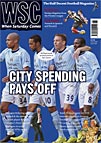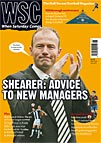 Dear WSC
Dear WSC
AFC Wimbledon fan Aled Thomas (Letters, WSC 267) bemoans people not knowing what to call his club. He would have enjoyed this exchange on Talksport on a recent Saturday when they decided to venture south of the Premier League, for a change. Ian Danter: “AFC Wimbledon could gain promotion to the Conference today.” Micky Quinn: “Is that the original club?” Danter (hesitantly): “Yes.” Quinn: “Do they still play at Plough Lane?” Why so knowledgeable?
Glyn Berrington, Brierley Hill
Search: ' Port Vale'
Stories
 There’s less at stake in the East Anglian derby than there once was, and discontent is in the air at the end of poor seasons for both clubs, but Ipswich are at least cheered by the prospect of pushing their neighbours closer towards the third tier and by the imminent ousting of an unpopular manager, as Csaba Abrahall witnessed
There’s less at stake in the East Anglian derby than there once was, and discontent is in the air at the end of poor seasons for both clubs, but Ipswich are at least cheered by the prospect of pushing their neighbours closer towards the third tier and by the imminent ousting of an unpopular manager, as Csaba Abrahall witnessed
It can’t have escaped your attention that the BBC recently moved Countryfile to prime-time on Sunday evenings. I’m not sure why, as it seemed the perfect accompaniment to coffee and croissants in its late-morning slot, but I imagine the unavailability of a large section of the agricultural community twice a year proved too detrimental to the viewing figures. The East Anglian derby hasn’t been played on a Saturday for 11 years and the scene at Diss station on this spring Sunday morning, rural-accented supporters in blue and white, green and yellow, heading to football instead of listening to John Craven’s views on otters, has become a common one.
 Harry Pearson ponders whether there really is a collective football sensibility in the north-east and concludes that there probably isn’t
Harry Pearson ponders whether there really is a collective football sensibility in the north-east and concludes that there probably isn’t
A dozen or so years ago I was sitting on a plane at Brussels airport. Our departure had been slightly delayed to allow passengers from a connecting flight to join us. Eventually they arrived and marched down the aisle to the rear of standard class, an elderly couple trailing the scent of sun tan oil and eau de cologne. Nothing unusual in that except that on closer inspection the pair turned out to be Newcastle United chairman Sir John Hall and his wife, Lady May.
 In 1989 football’s future was uncertain. Roger Titford looks at how Hillsbrough began a process which created a safer but less visceral experience for fans
In 1989 football’s future was uncertain. Roger Titford looks at how Hillsbrough began a process which created a safer but less visceral experience for fans
Just as they had been in 1969, the 1989 FA Cup semi-finals were scheduled for simultaneous 3pm kick-offs at Villa Park and Hillsborough. Twenty years on in 2009 they will be both be at Wembley on different days, live on TV and under the banner of “E.on, bringing families and football together”. If you can remember 1969 and 1989 you will read a hidden sub-text in that banner; something like “keeping young blokes and football apart”.
 John Turnbull reports on how a book about a Brit who played in the Soviet Union may not be all it seems
John Turnbull reports on how a book about a Brit who played in the Soviet Union may not be all it seems
Russian studies expert Jim Riordan includes dramatic tales in his memoir published last year, Comrade Jim: The Spy Who Played For Spartak. Such as a live cockroach appearing in the author’s cabbage salad at Moscow’s Higher Party School, where Riordan, a member of the British Communist Party, had enrolled. He also encounters Nikita Khrushchev, Yuri Gagarin and Lev Yashin and plays cricket with members of the Cambridge spy ring. Journalists and football historians in Russia have said little about these incidents. But regarding the central claim in Riordan’s book – that he started two home matches for Spartak Moscow in 1963, becoming the only Westerner to play in the top tier of Soviet football – they have one word: “nonsense”.